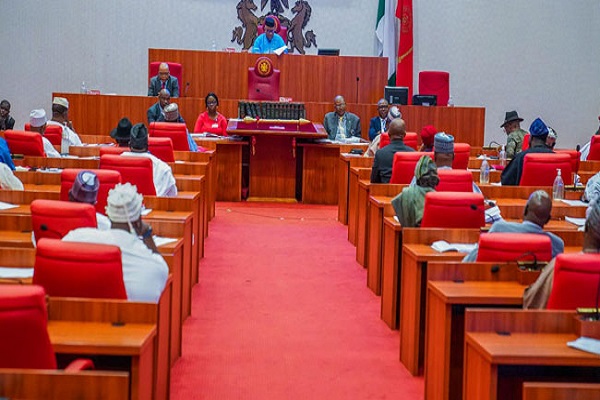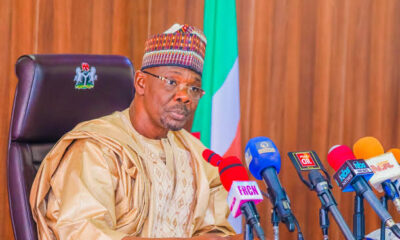News
Group plans curriculum for journalists on freedom of religion in Nigeria

Search for Common Ground (SFCG), a Non-Governmental Organisation (NGO) says it is working on plans to develop a curriculum for journalists on promoting freedom of religion and belief in Nigeria.
Mr Ogabiela Daniel, the Project Manager, SFCG, said this at a three-day workshop for development of curriculum on common ground journalism in relation to Freedom of Religion or Belief (FoRB) in Abuja.
Daniel said the project being supported by the Netherlands Embassy would equip journalists with improved capacities to produce conflict sensitive reporting on inter faith and FoRB related issues.
He said that the curriculum would establish effective Early warning/Early Response and Referral (EWER) mechanisms for addressing FoRB violations in Nigeria.
“The curriculum is going to reduce the insensitive reporting that we are experiencing at the moment,I am very confident of this because of all the inputs the high level media and executives here have done.
“This consciousness will now stay in the sector where everybody will be doing their reporting sensitively bearing in mind that inasmuch as freedom of religion is everybody’s rights, but they will do it responsibly,” he said.
Daniel said the curriculum would help to enhance public understanding of interfaith conflict and have greater access to neutral and conflict-sensitive information related to inter-faith harmony and cohesion.
Interim Country Director, SFCG, Fatima Madaki said that the organisation’s move to develop FoRB curriculum was against the backdrop of the fact that journalists wielded immense influence over public opinion and societal perceptions.
Madaki said it was a responsibility that carried not only the duty to inform but also the profound responsibility to do ethically and sensitively.
She said that the workshops focused on conflict-sensitive reporting within the framework of FoRB acknowledged the complexities that arise when covering issues that could be deeply personal and intertwined with cultural, social and political dynamics.
“We recognise that these issues are not just news stories; they are narratives that shape identities, values and relationships.
“The intersection between FoRB and journalism ca e fraught with challenges; how do we report on matters of faith and belief with sensitivity and respect for the diverse perspectives that exist?
“How can we ensure that our reporting contributes to peaceful coexistence rather than inadvertently fueling division?
“As we engage in these discussions, let us remember that our collective commitment to ethical journalism is a catalyst for positive change,’’she said
Madaki said that understanding the principles of common ground journalism would bridge divides, dispel misinformation and contribute to a world where freedom of religion or belief was celebrated as a cornerstone of diversity and harmony.’
Mr Temisan Etietsola, the National Media Specialist, SFCG,said the organisation decided to develop the curriculum against the backdrop of the numerous religious crisis.
“We found out that when the issues of religious conflicts happens in Nigeria, journalists tend to shy away from reporting it, but we are not proactive enough to report these issues on religious freedom of religious belief.
“So we decided to develop this curriculum, in conjunction with other journalists at the top level who know what they and their colleagues want.
“We then use it to train them on how to report conflict sensitive issues around FoRB and we also feel the need for journalists that are coming up even right from the school to know how to report conflicts around FoRB issues,” he said.
Headline
Prince Harry visits sick Nigerian soldiers in Kaduna

Prince Harry and his team visited the 44 Nigerian Army Reference Hospital in Kaduna to interact with wounded soldiers who are receiving treatment.
The Duke of Sussex is in Nigeria with his wife to champion the Invictus Games, which Harry founded to aid the rehabilitation of wounded and sick servicemembers and veterans.
Nigeria joined the Invictus Community of Nations in 2022 becoming the first African country to join.
Prince Harry’s visit to Kaduna came 68 years after his late grandmother Queen Elizabeth II visited the state during the time of the late Premier of Northern Region Sir Ahmadu Bello.




News
Senate approves death penalty for drug traffickers

Senate on Thursday, May 9, approved the death penalty for those convicted on the charge of drug trafficking in the country.
The punishment prescribed in the extant NDLEA Act is a maximum sentence of life imprisonment.
The resolution of the Senate followed its consideration of a report of the Committees on Judiciary, Human Rights and Legal Matters and Drugs and Narcotics, National Drug Law Enforcement Agency (NDLEA) Act (Amendment) Bill, 2024.
The Chairman of the Committee on Judiciary, Human Rights & Legal Matters presented the report during plenary, Senator Mohammed Monguno (APC-Borno North).
The bill, which passed its third reading, aims to update the list of dangerous drugs, strengthen the operations of the NDLEA, review penalties, and empower the establishment of laboratories.
Section 11 of the current act prescribes that “any person who, without lawful authority; imports, manufactures, produces, processes, plants or grows the drugs popularly known as cocaine, LSD, heroin or any other similar drugs shall be guilty of an offence and liable on conviction to be sentenced to imprisonment for life” was amended to reflect a stiffer penalty of death.
Although the report did not recommend a death penalty for the offence, during consideration, Senator Ali Ndume moved that the life sentence should be upgraded to the death penalty.
During a clause-by-clause consideration of the Bill, Deputy Senate President Barau Jibrin, who presided over the session, put the amendment on the death penalty to a voice vote and ruled that the “ayes” had it.
But Senator Adams Oshiomhole objected to the ruling, saying that the “nays” had it.
He argued that matters of life and death should not be treated hurriedly, but Barau said it was too late, as he failed to call for division immediately after his ruling.
The bill was subsequently read for the third time and passed by the Senate.


















